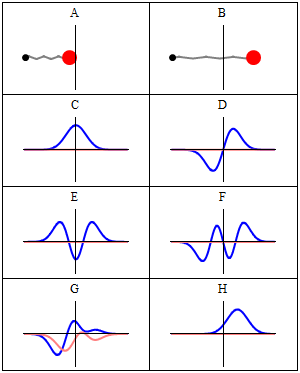File:QuantumHarmonicOscillatorAnimation.gif
外观
QuantumHarmonicOscillatorAnimation.gif (300 × 373像素,文件大小:759 KB,MIME类型:image/gif、循环、97帧)
文件历史
点击某个日期/时间查看对应时刻的文件。
| 日期/时间 | 缩略图 | 大小 | 用户 | 备注 | |
|---|---|---|---|---|---|
| 当前 | 2011年3月2日 (三) 09:16 |  | 300 × 373(759 KB) | Sbyrnes321 | Alter spring, to avoid the visual impression that the ball is rotating in a circle around the y-axis through the third dimension. |
| 2011年3月1日 (二) 22:55 |  | 300 × 373(733 KB) | Sbyrnes321 | Add zigzag spring; shrink image to 300px width; increase frame count to 97. | |
| 2011年2月27日 (日) 23:58 |  | 347 × 432(707 KB) | Sbyrnes321 | Switched from 100 frames to 80 frames, to be under the 12.5-million-pixel limit for animations in wikipedia articles. | |
| 2011年2月27日 (日) 23:06 |  | 347 × 432(887 KB) | Sbyrnes321 | {{Information |Description ={{en|1=A harmonic oscillator in classical mechanics (A-B) and quantum mechanics (C-H). In (A-B), a ball, attached to a spring (gray line), oscillates back and forth. In (C-H), wavefunction solutions to the Time-Dependent Sch |
文件用途
全域文件用途
以下其他wiki使用此文件:
- af.wikipedia.org上的用途
- ar.wikipedia.org上的用途
- bn.wikipedia.org上的用途
- bs.wikipedia.org上的用途
- en.wikipedia.org上的用途
- Quantum mechanics
- Quantum harmonic oscillator
- Schrödinger equation
- Wave function
- Neural binding
- Stationary state
- User:Sbyrnes321
- Wikipedia:Featured picture candidates/May-2011
- Wikipedia:Featured picture candidates/Quantum Harmonic Oscillator
- User:Maschen/Schrödinger equation (exact solutions)
- User:Bob Rericha/Gather lists/12973 – Quantum
- en.wikiversity.org上的用途
- fa.wikipedia.org上的用途
- fr.wikipedia.org上的用途
- gl.wikipedia.org上的用途
- hi.wikipedia.org上的用途
- hr.wikipedia.org上的用途
- hy.wikipedia.org上的用途
- id.wikipedia.org上的用途
- it.wikipedia.org上的用途
- it.wikibooks.org上的用途
- ja.wikipedia.org上的用途
- ka.wikipedia.org上的用途
- mk.wikipedia.org上的用途
- my.wikipedia.org上的用途
- pa.wikipedia.org上的用途
- pl.wikipedia.org上的用途
- pnb.wikipedia.org上的用途
- pt.wikipedia.org上的用途
- ro.wikipedia.org上的用途
- ru.wikipedia.org上的用途
查看此文件的更多全域用途。


